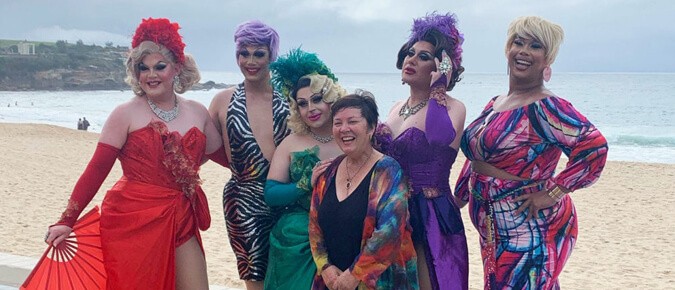Julie McCrossin, Cancer Council NSW, 25 Feb 2021

In 2013 I was diagnosed with stage four oropharyngeal cancer. It was in my tonsils, the back of my tongue and the side of my throat. The symptoms that kept me going back to my GP repeatedly were a persistent sore throat, a pain in my left ear and two small lumps on my neck.
Until recently, the most common causes of this cancer in the throat region have been smoking tobacco and heavy alcohol consumption. I gave up drinking alcohol altogether in 1979 and I hadn’t smoked for over 30 years. I was totally shocked to be told I had cancer. I soon learned that the most common cause of oropharyngeal cancer in western countries is now HPV, the Human Papillomavirus.
My treatment
My cancer was successfully treated with 30 sessions of radiation and weekly chemotherapy.
The side-effects of treatment are very tough with this cancer. Personally, I completely lost the capacity to speak for over three months. My swallowing was affected severely and I could only swallow liquid food very slowly for several months. I lost over 20kg during treatment.
A key cause of stress for me during my radiation treatment was the need to wear an immobilisation mask. These hard, plastic, full-face masks are used to click our heads down, so we keep completely still while the radiation beam targets the tumours inside our head and neck. Radiation does not hurt. You do not feel it during treatment. But I felt claustrophobic and a bit panicky inside the mask. I asked for help and was given mild sedation, music to listen to and the support of a nurse and a psychologist. All of this was a great relief.
However, I was traumatised by the initial shock of the mask and the need to wear it 30 days in a row for twenty minutes of treatment per session. Many patients are able to cope with the mask better than I did.
My life now
My loving wife Melissa has been crucial for my practical care and emotional support throughout treatment and during my recovery.
It is now nearly eight years since my diagnosis. I eat, swallow and speak almost normally. I do need water with me when I eat, and I occasionally choke on my food. However, compared to many of my fellow head and neck cancer patients, my life has returned to normal.
The love of our two adult children, Luke and Amelia and the support of close friends also helped me to accept treatment and enjoy my life again. Melissa gave me a tiny cavoodle called Bruno, when I was very low, and this little dog lifts my spirits every day.
For my LGBTQI peers, here are three key lessons I learnt as a cancer survivor that I’d like to share with you:
1. Access reliable information about your cancer as soon as possible
My family and I would have been lost without the Cancer Council booklet Understanding Head and Neck Cancer. It provided comprehensive information that not only answered many questions for us, but it also helped us identify key questions we needed to ask our doctors and other team members. You don’t know what you don’t know. The Cancer Council booklet alerted us to issues we needed to discuss with the cancer team.
2. You have the right to feel respected and heard
When you face cancer as a lesbian woman and a member of the LGBTQI community, the most important thing is to feel welcome, respected and confident that your family, children and friends will be treated with the same kindness and care as any other family and friends in the community.
It is a great relief when a health service or support organisation makes it absolutely clear that LGBTQI people are welcome and that the staff have received some training and information about our community and the potential for special needs. Cancer Council does make this clear with publications and supports that specifically address our needs as cancer patients and carers.
3. There are support services available – don’t go it alone
Cancer Council’s 13 11 20 Information and Support Line, which is staffed by health professionals, is important for everyone affected by cancer, as are the many Cancer Council publications, support groups and legal and financial services.
My first message as a lesbian cancer survivor to my LGBTQI peers is that we can benefit from everything Cancer Council offers. My second message is we can trust that, if we ring 13 11 20 and ask questions related to our personal LGBTQI circumstances, the staff will help us with kindness, respect and a growing number of resources designed for us.
Have you listened to The Thing About Cancer podcasts?
No-one should face cancer alone. If you are affected by cancer, reach out and ask for help. Cancer Council is committed to providing evidence-based, up-to-date information, support and research. Take advantage of this service. Give yourself the best chance of survival and recovery.
Since my treatment, I have helped to create podcasts for cancer patients and their families. These interviews with a series of cancer experts on a wide range of topics, with comments from patients and families, have helped me in my own recovery.
The cancer experience is more than the challenges of the treatment and its side effects. The emotional and psychological impact can be very profound and long-lasting. Many of us, including myself, confront the possibility of early death or disability. I have found the Cancer Council podcasts with doctors, psychiatrists, psychologists and specialist nurses comforting, informative and helpful in managing my fears.
Originally published: https://www.cancercouncil.com.au/blog/3-things-gay-rights-advocate-julie-mccrossin-wants-you-to-know-about-cancer/